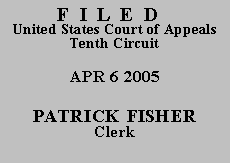

|
FRANKLIN DECKARD,
v.
RON WARD |
|
Before BRISCOE, LUCERO, and MURPHY, Circuit Judges.
After an Oklahoma jury trial, Deckard was convicted of one count of First Degree Murder and one count of Attempted First Degree Murder. He was sentenced to life imprisonment without the possibility of parole on the First Degree Murder conviction and life imprisonment with the possibility of parole on the Attempted Murder conviction. Deckard appealed the convictions and his sentence. Specifically he argued that (1) he was denied a fair trial because the prosecutor misled the jury regarding the burden of proof on his defense of insanity, (2) there was insufficient evidence to prove he was sane beyond a reasonable doubt, (3) the trial court committed reversible error when it failed to instruct upon second degree murder, (4) prosecutorial misconduct deprived him of a fair trial, (5) his defense counsel was ineffective, and (6) his sentences were excessive. The Oklahoma Court of Criminal Appeals ("OCCA"), however, affirmed Deckard's convictions and sentences.
Deckard filed the instant § 2254 habeas petition on February 5, 2001. In his petition, Deckard raised three claims of error: (1) the trial court's failure to instruct on second degree murder deprived him of a fair trial, (2) defense counsel rendered constitutionally ineffective assistance, and (3) prosecutorial misconduct rendered his trial fundamentally unfair. The district court addressed each claim. It first concluded that Deckard's claim relating to the failure to give a second degree murder instruction did not raise a federal constitutional question. Lujan v. Tansy, 2 F.3d 1031, 1036 (10th Cir. 1993) ("[A] petitioner in a non-capital case is not entitled to habeas relief for the failure to give a lesser-included instruction even if in our view there was sufficient evidence to warrant the giving of an instruction on a lesser included offense." (quotation omitted)). Next, applying the standard set forth in the Antiterrorism and Effective Death Penalty Act ("AEDPA"), the district court concluded that the OCCA's adjudication of Deckard's two remaining claims was not contrary to, nor an unreasonable application of clearly established federal law. 28 U.S.C. § 2254(d). Accordingly, the district court denied Deckard relief on all three claims raised in the § 2254 petition.(*)
This court cannot grant Deckard a COA unless he can demonstrate "that reasonable jurists could debate whether (or, for that matter, agree that) the petition should have been resolved in a different manner or that the issues presented were adequate to deserve encouragement to proceed further." Slack v. McDaniel, 529 U.S. 473, 484 (2000) (quotations omitted). In evaluating whether Deckard has carried his burden, this court undertakes "a preliminary, though not definitive, consideration of the [legal] framework" applicable to each of his claims. Miller-El v. Cockrell, 123 S. Ct. 1029, 1040 (2003). Deckard is not required to demonstrate that his appeal will succeed to be entitled to a COA. He must, however, "prove something more than the absence of frivolity or the existence of mere good faith." Id. (quotations omitted).
This court has reviewed Deckard's application for a COA and appellate brief, the district court's order, and the entire record on appeal pursuant to the framework set out by the Supreme Court in Miller-El and concludes that Deckard is not entitled to a COA. The district court's resolution of Deckard's claims is not reasonably subject to debate and the claims are not adequate to deserve further proceedings. Accordingly, Deckard has not "made a substantial showing of the denial of a constitutional right" and is not entitled to a COA. 28 U.S.C. § 2253(c)(2).
This court denies Deckard's request for a COA and dismisses this appeal.
Entered for the Court
PATRICK FISHER, Clerk of Court
By
Deputy Clerk
*.In his application for COA and supporting brief, Deckard raises additional claims which were presented to the OCCA but which were not presented to the district court. Because these claims were not raised before the federal district court, we will not consider them. See Green v. Dorrell, 969 F.2d 915, 917 (10th Cir. 1992).